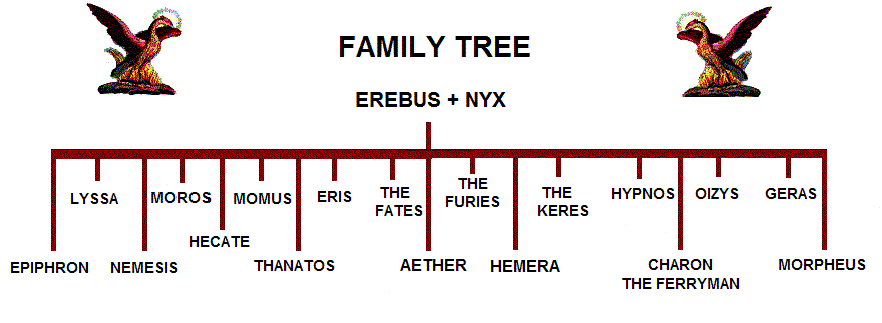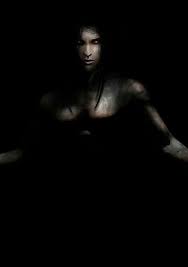Erebus
Darkness
Darkness. The very word conjures up ideas of dangerous, shadowy things lurking, of things that terrify and of emotions that frighten. Think of any horror movie you've ever seen in your life and ask yourself when the worst things possible seem to leap out with blood-curdling screams? In the dark. In the absence of light.
Yeah, darkness truly gets a bad rap. But there's a silver lining to the velvety thickness of the dark; without darkness, you could have no brilliant, twinkling stars, the silver, magical moon could never shine nor could entranced lovers dance by candlelight. Darkness goes both ways, and that's exactly how the ancient Greeks saw it, too. It wasn't evil by itself; nasty things just chose to happen when it occurred.
And the deity that actually WAS darkness was an old one, one of the very first beings to ever exist when Chaos ended; EREBUS was one of the protogenoi (pro-tow-jen-oy), one of the "first beings," and his job, opposite his beautiful wife, Nyx, the night herself, was to bring on the darkness at the end of each day so that she could bring the stars to shine down upon the earth. He and his luminous wife were both considered two of the original Titans, the "gods before the gods," and their pairing couldn't have fit together any finer.
Without him, she was absolutely nothing at all, and without her, his job was completely meaningless; they complemented each other and gave each other purpose. A pretty romantic partnership when you look at it.
Erebus' thick, cloudy mists of darkness were said to fill every nook and cranny at the edges of the world where the domed sky met the earth each night, and that mist also filled every hollow, crevasse and cave deep beneath the earth. He marched ahead of Nyx every evening, spreading the darkness across the sky while she followed close behind with her gown of stars flowing behind her.
Every morning, the couple would return to their home in the Underworld (in a section actually named "Erebus," in honor of darkness' contributions to the world and land of the dead!) and their daughter, Hemera (Day), would rise, scattering what was left of Erebus' dark mists. Shortly after, Helios (or Apollo, depending on the story), would ride across the sky in his sun chariot, starting the cycle all over again.
Both Erebus and Nyx stayed neutral in all-out war between the Titans and their offspring, the Olympians, and as a result, when it was all over, Zeus, the king of the gods, allowed them to remain in place, continuing on with their jobs. The two had many children, many of whom became quite famous and who have very unique stories of their own; Hypnos (Sleep), Thanatos (Death), Hemera (Day), Aether (Goddess of the Blue Sky), Nemesis (Divine Retribution) and others.
Throughout Greek mythology, they seldom have any personal adventures, but are mentioned as the proud parents of the many gods, goddesses, creatures and spirits they gave birth to. Many of their kids were tightly wound into the family business of night and darkness, or at least had a "darker" nature or personality. As far as anyone knows, they still do their nightly dance across the skies, lovers in all things dark and starry...
[1]














